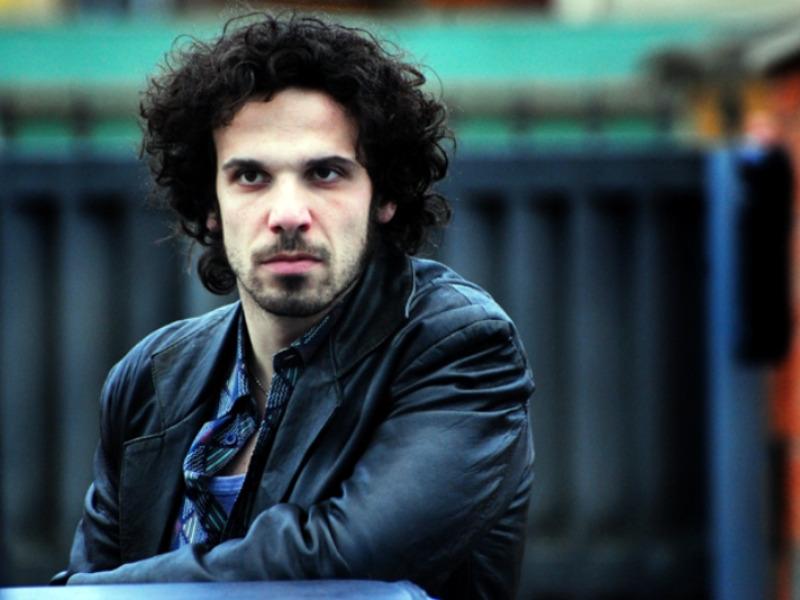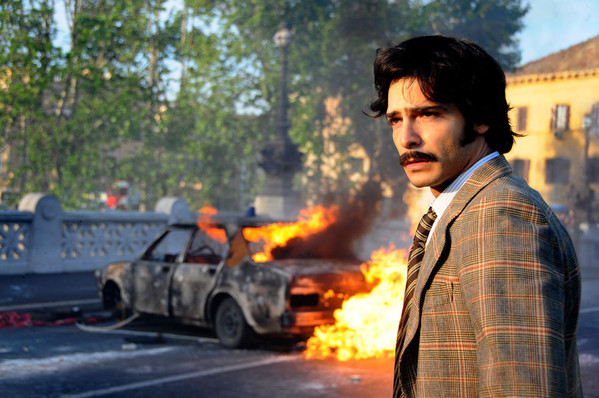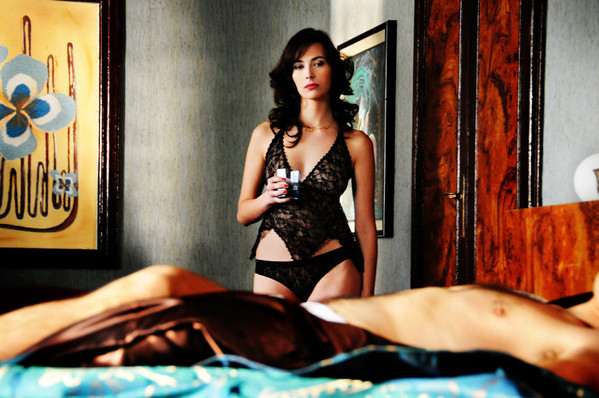Romanzo Criminale, Sky Arts 1 | reviews, news & interviews
Romanzo Criminale, Sky Arts 1
Romanzo Criminale, Sky Arts 1
Italian police procedural is in love with its handsome gang of young villains

Unless one has been misreading the policy stylings of the oddly named "Nigel Farage" and his merry band of isolationists, the general idea behind UKIP is that Nothing Good ever came out of Europe. Party members may therefore wish to pursue a blanket avoidance of decent crime drama, almost all of which comes from our continental neighbours. First there was The Killing which went on more or less forever and was more addictive than crack. Spiral was barely less cultish.
Romanzo Criminale – the title literally means “crime novel” – is adapted from a bestselling crime novel by author-judge Giancarlo De Cataldo which flew off the shelves in 2002. Loosely based on the activities of a criminal gang who in the 1970s set out to run Rome and found themselves lured towards the epicentre of Italy’s sick body politic, it has already been the subject of a film version, but such has been its moreish impact on Italian audiences that they happily stuck around for the 22-hour televisual reboot.
The show opened last week as it presumably means to go on. An old codger was being thwacked to bits on the streets of a modern Roman suburb. Blood flew from his nose and mouth (suggest you get used to this). He picked himself up, dusted himself down, located his assailants in a café and shot one of them in the knee, then in the chest. “I ran with Lebanese!” he screamed to no one in particular, the street having swiftly emptied.
 We then spooled back through the retro-credits to the year of our Lord 1977. The radio brought news of the Red Brigade, while out on the streets students were rioting against police brutality. Lebanese – Il Libanese, as they call him in Italian (played by Francesco Montanari) – rounded up his gang to heist a lorry-load of Olivetti typewriters. It all went a bit tits up, but Lebanese is a young thug with a pitch-black heart and was soon using the slender profits to buy guns. Later, when a moneybags the gang had kidnapped was accidentally killed by his hired captors, the hired captors were themselves killed, not accidentally.
We then spooled back through the retro-credits to the year of our Lord 1977. The radio brought news of the Red Brigade, while out on the streets students were rioting against police brutality. Lebanese – Il Libanese, as they call him in Italian (played by Francesco Montanari) – rounded up his gang to heist a lorry-load of Olivetti typewriters. It all went a bit tits up, but Lebanese is a young thug with a pitch-black heart and was soon using the slender profits to buy guns. Later, when a moneybags the gang had kidnapped was accidentally killed by his hired captors, the hired captors were themselves killed, not accidentally.
By last night’s second episode, having teamed up with another mob led by a cold-blooded strategist called, appropriately, Ice (Freddo), Lebanese had formed the nucleus of the Banda della Magliana. They are still basically incompetent, mind. Two junior members buried a body where they assumed no one would find it, only to discover that the remote plot was planned for an upscale development. One of the gang wanted to spend his earnings on a highly conspicuous Porsche, strictly in contravention of the group ethos of pooling their winnings, driving around in clapped-out bangers and living in trailers.
It would be unwise to hope for any of the chillier flavours of other Euro-cop shows. Romanzo Criminale is hot-tempered, noisy, gobby, flashy: in short, Italian, if you’ll pardon the stereotyping – much more Italian, in point of fact, than the late, lamented Zen. Strictly speaking it’s not even a cop show, not yet. We’ve been tailing the lushly moustachioed detective Scialoja (Marco Bocci, pictured above), suspected by his colleagues of being a commie, but there aren’t many leads for him to go on as yet for all his snooping around with a long lens. No doubt he’ll start to reel the Banda in, but for the moment it’s a case of watching them build an empire and muscle in with the arrogance of youth on the territory of older rival bosses.
 It looks terrific, steeped in the tacky atmospherics of 1970s Rome. Every historical detail feels exactly right, down to the not so natty threads and period centre-partings. Last night brought a highly promising development with the introduction of a female character – Patrizia (Daniele Virgilio, pictured above), a toothsome squeeze for the gang’s snake-hipped clothes horse known as Dandi. So far she seems to be contractually obliged to wear nothing. Lebanese remains unimpressed at Dandi's mooning: “Does she have two tongues, four tits?” But then Lebanese doesn’t have time for women, not even his lonely mamma whose food he has no time to eat, and you suspect he never will.
It looks terrific, steeped in the tacky atmospherics of 1970s Rome. Every historical detail feels exactly right, down to the not so natty threads and period centre-partings. Last night brought a highly promising development with the introduction of a female character – Patrizia (Daniele Virgilio, pictured above), a toothsome squeeze for the gang’s snake-hipped clothes horse known as Dandi. So far she seems to be contractually obliged to wear nothing. Lebanese remains unimpressed at Dandi's mooning: “Does she have two tongues, four tits?” But then Lebanese doesn’t have time for women, not even his lonely mamma whose food he has no time to eat, and you suspect he never will.
Stefano Sollima directs with energetic flair and a nose for comedy. These cocksure young men are as much buffoons as hoodlums, bickering over who gets to ride the Vespa after demanding a ransom, high-fiving after a stick-up. There was a lovely scene where the three leaders bonded over an al-fresco piss that felt at once both contrived and illustrative of, believe it or not, their vulnerability. Along with the laughs there will be bankrobbing, kidnapping, drug-running and, where necessary, murdering. So far it seems to be necessary at least twice an episode. The tricky dilemma is that you are already rooting for these pitiless villains, who ended episode two with an innocent kickabout on the beach. How many hours it’ll take to go off them will of course be part of the drama.
Add comment
The future of Arts Journalism
You can stop theartsdesk.com closing!
We urgently need financing to survive. Our fundraising drive has thus far raised £33,000 but we need to reach £100,000 or we will be forced to close. Please contribute here: https://gofund.me/c3f6033d
And if you can forward this information to anyone who might assist, we’d be grateful.

Subscribe to theartsdesk.com
Thank you for continuing to read our work on theartsdesk.com. For unlimited access to every article in its entirety, including our archive of more than 15,000 pieces, we're asking for £5 per month or £40 per year. We feel it's a very good deal, and hope you do too.
To take a subscription now simply click here.
And if you're looking for that extra gift for a friend or family member, why not treat them to a theartsdesk.com gift subscription?
more TV
 This City is Ours, BBC One review - civil war rocks family cocaine racket
Terrific cast powers Stephen Butchard's Liverpool drug-ring saga
This City is Ours, BBC One review - civil war rocks family cocaine racket
Terrific cast powers Stephen Butchard's Liverpool drug-ring saga
 The Potato Lab, Netflix review - a K-drama with heart and wit
Love among Korean potato-researchers is surprisingly funny and ideal for Janeites
The Potato Lab, Netflix review - a K-drama with heart and wit
Love among Korean potato-researchers is surprisingly funny and ideal for Janeites
 Adolescence, Netflix review - Stephen Graham battles the phantom menace of the internet
How antisocial networks lead to real-life tragedy
Adolescence, Netflix review - Stephen Graham battles the phantom menace of the internet
How antisocial networks lead to real-life tragedy
 Drive to Survive, Season 7, Netflix review - speed, scandal and skulduggery in the pitlane
The F1 documentary series is back on the pace
Drive to Survive, Season 7, Netflix review - speed, scandal and skulduggery in the pitlane
The F1 documentary series is back on the pace
 A Cruel Love: The Ruth Ellis Story, ITV1 review - powerful dramatisation of the 1955 case that shocked the public
Lucy Boynton excels as the last woman to be executed in Britain
A Cruel Love: The Ruth Ellis Story, ITV1 review - powerful dramatisation of the 1955 case that shocked the public
Lucy Boynton excels as the last woman to be executed in Britain
 Towards Zero, BBC One review - more entertaining parlour game than crime thriller
The latest Agatha Christie adaptation is well cast and lavishly done but a tad too sedate
Towards Zero, BBC One review - more entertaining parlour game than crime thriller
The latest Agatha Christie adaptation is well cast and lavishly done but a tad too sedate
 Bergerac, U&Drama review - the Jersey 'tec is born again after 34 years
Damien Molony boldly follows in the hallowed footsteps of John Nettles
Bergerac, U&Drama review - the Jersey 'tec is born again after 34 years
Damien Molony boldly follows in the hallowed footsteps of John Nettles
 A Thousand Blows, Disney+ review - Peaky Blinders comes to Ripper Street?
The prolific Steven Knight takes us back to a squalid Victorian London
A Thousand Blows, Disney+ review - Peaky Blinders comes to Ripper Street?
The prolific Steven Knight takes us back to a squalid Victorian London
 Zero Day, Netflix review - can ex-President Robert De Niro save the Land of the Free?
Panic and paranoia run amok as cyber-hackers wreak havoc
Zero Day, Netflix review - can ex-President Robert De Niro save the Land of the Free?
Panic and paranoia run amok as cyber-hackers wreak havoc
 The White Lotus, Series 3, Sky Atlantic review - hit formula with few surprises but a new bewitching soundtrack
Thailand hosts the latest bout of Mike White's satirical takedown of the rich and privileged
The White Lotus, Series 3, Sky Atlantic review - hit formula with few surprises but a new bewitching soundtrack
Thailand hosts the latest bout of Mike White's satirical takedown of the rich and privileged
 Hacks, Season 3, NOW review - acerbic showbiz comedy keeps up the good work
Jean Smart's portrayal of Deborah Vance is an all-time classic
Hacks, Season 3, NOW review - acerbic showbiz comedy keeps up the good work
Jean Smart's portrayal of Deborah Vance is an all-time classic
 Surviving Black Hawk Down, Netflix review - the real story behind Ridley Scott's Oscar-winner
Documentary series looks at the 1993 'Battle of Mogadishu' from both sides
Surviving Black Hawk Down, Netflix review - the real story behind Ridley Scott's Oscar-winner
Documentary series looks at the 1993 'Battle of Mogadishu' from both sides

Comments
Yes you have been misreading
UKIP is not isolationist. Far